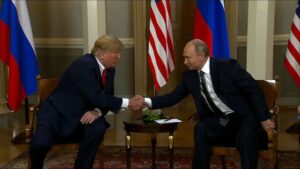President Donald Trump has suggested denuclearization talks with Russia and China during the World Economic Forum, emphasizing the high costs associated with nuclear programs. His proposal raises the possibility of reducing global nuclear arsenals, though concerns about compliance from both nations linger.
Trump Proposes Denuclearization Talks with Russia and China

Trump Proposes Denuclearization Talks with Russia and China
President Trump's recent calls for denuclearization negotiations mark a potential shift in nuclear policy amid global tensions.
President Donald Trump is indicating a notable shift in global nuclear policy, expressing interest in denuclearization talks with Russia and China. During his address at the World Economic Forum in Davos, he underscored the enormous financial drain posed by nuclear weapons programs and stressed the importance of initiating negotiations.
“Tremendous amounts of money are being spent on nuclear, and the destructive capacity is something we don’t even want to talk about today because you don’t want to hear it,” Trump noted, urging discussions between Washington, Moscow, and Beijing to explore potential arms reduction agreements.
This proposal surfaces amid continued tensions in U.S.-Russia and U.S.-China relations. In 2023, Russian President Vladimir Putin announced a halt to participation in the New START treaty, a critical nuclear arms control agreement, blaming the U.S. for its support of Ukraine. Additionally, Moscow has faced accusations of breaching the treaty's regulations. On the other hand, China has not engaged in formal arms reduction discussions with the United States, presenting significant challenges to any new agreements.
Trump’s push for nuclear talks could signify a pivotal moment in U.S. foreign policy history, opening the door for a potential decrease in the global nuclear arsenal. However, it prompts skepticism regarding the reliability of Russia and China in adhering to any such agreements.
As these diplomatic conversations advance, the world watches closely to see if Washington, Moscow, and Beijing can bridge their differences, or if they remain entrenched in a nuclear standoff, adhering to long-standing geopolitical tensions.



















